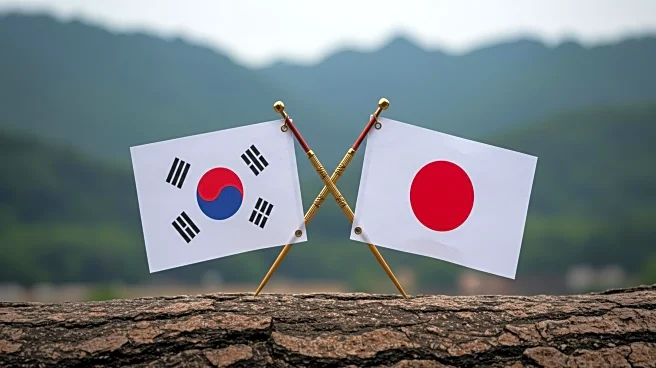What's Happening?
South Korean President Lee Jae Myung and Japanese Prime Minister Shigeru Ishiba have agreed to strengthen cooperation between their countries through a bilateral summit held in Tokyo. The leaders announced the formation of an intergovernmental consultative body aimed at addressing shared challenges, including economic security, defense, and artificial intelligence. This summit marks a significant step in improving bilateral relations, as both countries face similar challenges in the global trade order and regional security threats. The leaders also reaffirmed their commitment to the denuclearization of the Korean Peninsula and emphasized the importance of trilateral cooperation with the United States.
Why It's Important?
The agreement between South Korea and Japan to enhance cooperation is crucial in the context of shifting global trade dynamics and regional security concerns. Both countries are key players in the Asia-Pacific region and face common challenges such as North Korea's nuclear ambitions and economic pressures from global trade restructuring. Strengthening ties could lead to more effective responses to these issues, benefiting regional stability and economic growth. The collaboration also underscores the importance of trilateral relations with the United States, which could influence broader geopolitical strategies in the region.
What's Next?
The formation of the consultative body is expected to facilitate ongoing dialogue and cooperation between South Korea and Japan. Future discussions may focus on specific areas such as technology, defense, and economic policies. Additionally, the leaders' commitment to addressing North Korea's nuclear program suggests that further diplomatic efforts and coordination with the United States will continue. The summit also sets the stage for President Lee's upcoming meeting with U.S. President Donald Trump, where these issues are likely to be further discussed.
Beyond the Headlines
The summit highlights a potential shift in the historical tensions between South Korea and Japan, as both countries seek to prioritize mutual benefits over past disputes. This development could lead to a more stable and cooperative regional environment, fostering economic and security partnerships that extend beyond bilateral relations. The focus on modern challenges such as artificial intelligence and economic security indicates a forward-looking approach that may influence future policy directions in both countries.









